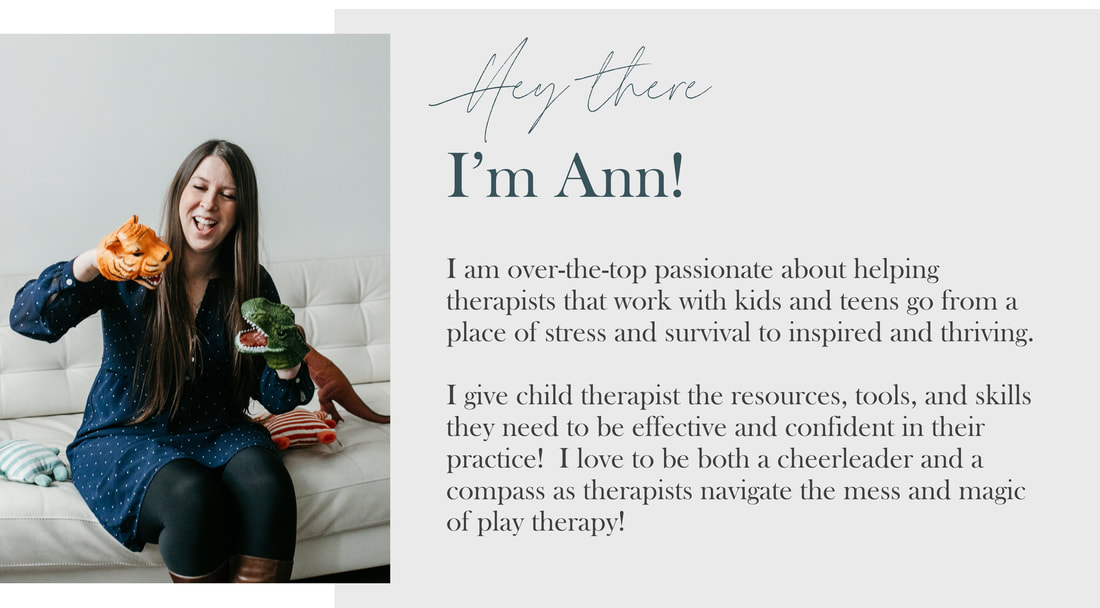|
How much time do you spend at the beginning of the therapy process with children setting expectations?
Let me backup a minute.
A huge stress of being a child and adolescent therapist is that you are working with so many invested parties. First and foremost you have the child, their symptoms, and what they want to get out of the process. AND this can be tricky because most children don’t sign themselves up for therapy and sometimes, frankly - they just don’t want to go or engage. They can also deny their symptoms (no, I never have outbursts or get upset) or not see them to be an issue (my brother is too sensitive, he needs to get over it).
Then there is the perspective of their parents. Parents are likely impacted by their child’s mental health and may have an agenda of what they want to see happen, how fast it should happen, and what is the path forward that may or may not be in line with your clinical opinion for therapy or what the child wants. And, this is further complicated if you are working with divorced, separated, or high conflict co-parents who may have opposite thoughts and perspectives than one another. One parent thinks everything is fine and their child has no difficulties while the other one is overwhelmed, struggling, and seeing their child in pain. Next, we have other invested parties like school or daycare that may be observing behaviors, symptoms, or patterns they are concerned about. So when we start the therapy process with all of these different perspectives and agendas taking time to set expectations isn’t just a nice thing to do - it is essential to the child’s success in therapy. Imagine how disappointed and frustrated a parent could be if their belief is that they can drop their child off with you, you will “tell the child what to do differently”, the child will magically do it, and in 4 weeks this problem they have been dealing with for the past 2 years will be gone. My experience is that it never goes this way. And in fact therapy in this way is not how I do therapy. Parents may also be informed by a medical model that is more fitting with the doctors office where they go in for a concern or difficulty, get medication or ideas, follow up in 6 weeks and have rapid resolution. This can be a fitting expectation for medical conditions like mild rashes, some broken bones, or transient illnesses, but typically not with mental health difficulties that have likely been present for months (and more likely years) before they present in the therapy office. And other times they might have had an experience with another therapist or heard about therapy from a friend or a family member that might not be exactly how you do things. AND the exact ways in which I operate in my therapy practice are likely not exactly the same as yours - and all of that is okay! Clear expectations from the beginning of therapy with things like schedule, timeframe of therapy, and parent involvement actually makes parents (and children) happier and more engaged in the process. Research also shows that increased parent involvement in therapy and goal setting leads to better therapeutic results. I have developed an Informed Consent process where I clearly explain to parents and children during the first session the expectations for therapy. I like to say that therapists are like teachers - two can teach the same subject but don’t do so in exactly the same way. By taking the time to explain to parents and children the structure of therapy and participation you are giving them the opportunity to continue therapy with you (fully knowing the process) or seeking out someone else that might better fit their needs. This also avoids the distress of 6 weeks into the process parents stressing because their child has not had rapid symptom improvement, is frustrated because they have to take time out of their day to be present at the therapy appointment, or having confusion about why you are “just playing” with their child. So how exactly do you incorporate this into your therapy practice? First things first, sit down and clarify all your policies and procedures for how you work with children. See my free downloadableInformed Consent that has my checklist of how I communicate my expectations and practices with families. You can have this as a printable document, a page on your website (like mine here and here on my practice website), or as a checklist for yourself (like I do) that I go over the first session. The expectations I find it most important to clarify for parents include my expectation that parents will be an active and involved part of therapy (see more about my parent check in HERE). Next, I find it essential to clarify how long the therapy process will be and what factors go into determining therapy length. Dive deeper into the 12 factors I talk about with parents when discussing therapy length. Then, if I am seeing a child with divorced or separated parents I am extremely clear in my role as a mental health therapist, not that of a custody evaluator, mediator, or parenting consultant. And lastly I find it crucial to discuss my schedule. Parents sometimes will come in for an intake at noon, but expect after that to get a 5:00 spot on a Tuesday for the rest of their child’s therapy. Setting expectations with schedule increases your chances of the parent being able to consistently bring their child to therapy sessions. If you need scheduling support check out this course HERE. I encourage you to set some time aside to get really clear about how you clarify expectations for parents and implement some of these practices into your intake process! What else am I missing? What are other ways or topics you find essential to clarify with parents? Loading...
0 Comments
Leave a Reply. |
Hi, there!I'm Ann Meehan, an LPCC, Loading... Archives
July 2024
Categories
All
|
Privacy Policies | Terms of Use | Disclaimer
Contact
[email protected] | Copyright Meehan Mental Health Services 2022
Contact
[email protected] | Copyright Meehan Mental Health Services 2022







